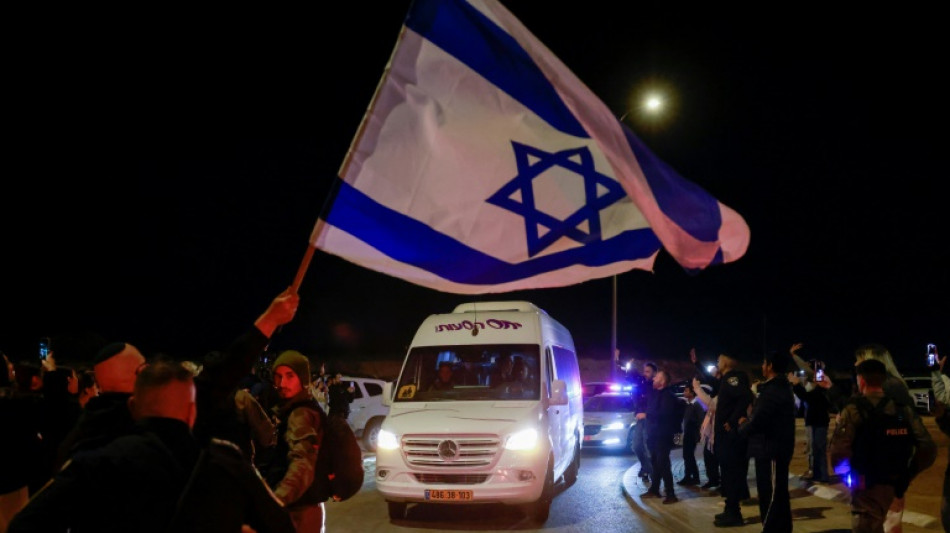

Israel and Hamas extend truce for one day
Israel and Hamas extended their truce by another day on Thursday as Washington's top diplomat arrived to urge a more lasting break in the devastating conflict.
The warring parties have agreed a pause in fighting to allow time for the militant group to release Israeli hostages in exchange for Palestinian prisoners.
But international pressure is mounting for a longer truce to allow medical supplies, food and fuel into the besieged Gaza Strip after fierce combat and bombardments sparked by Hamas's bloody October 7 attacks on Israel.
"We have seen over the last week the very positive development of hostages coming home, being reunited with their families," US Secretary of State Antony Blinken said at a meeting with Israeli President Isaac Herzog in Tel Aviv.
"It's also enabled an increase in humanitarian assistance to go to innocent civilians in Gaza who need it desperately. So this process is producing results. It's important, and we hope that it can continue."
The latest extended truce had been due to end at 0500 GMT, but the Israeli army said the "operational pause" would continue as international mediators negotiate the release of hostages held by Hamas.
Hamas, the Islamist movement that has ruled Gaza since 2007, said there was an agreement to "extend the truce for a seventh day", without giving further details.
It had earlier said Israel initially refused to extend the truce after it offered to hand over seven hostages and the bodies of three more.
Qatar, which has led the truce negotiations supported by Egypt and the United States, confirmed the pause had been extended for a day "under the same previous conditions." Israel did not give a timeframe.
- US hopes truce can continue -
Fighting began on October 7 when Hamas militants broke through Gaza's militarised border into Israel, killing 1,200 people, mostly civilians, and kidnapping about 240, according to Israeli authorities.
In response, Israel vowed to eliminate Hamas and unleashed an air and ground military campaign that the Hamas government says has killed more than 15,000 people in Gaza, also mostly civilians.
The truce agreement allows for extensions if Hamas can continue to release 10 hostages per day, but both sides have warned they are ready to return to fighting.
Late Wednesday, 10 more Israeli hostages were freed under the terms of the deal, with another four Thai hostages and two Israeli-Russian women released outside the framework of the arrangement.
Video released by Hamas showed masked gunmen handing hostages to the International Committee of the Red Cross.
Among those freed was Liat Beinin, who also holds American citizenship and works as a guide at Israel's Holocaust museum Yad Vashem.
Shortly after the hostages arrived in Israel, the country's prison service said 30 Palestinian prisoners had been released, including well-known activist Ahed Tamimi.
Since the truce began on November 24, 70 Israeli hostages have been freed in return for 210 Palestinian prisoners.
At least 24 foreigners, most of them Thais living in Israel, have been freed outside the terms of the deal.
- 'Humanitarian catastrophe' -
Israel has made clear it sees the truce as a temporary halt intended to free hostages, but there are growing calls for a more sustained pause in fighting.
United Nations Secretary-General Antonio Guterres demanded a "true humanitarian ceasefire", warning Gazans are "in the midst of an epic humanitarian catastrophe".
And China, whose top diplomat Wang Yi was in New York for UN Security Council talks on the violence, urged an immediate "sustained humanitarian truce", in a position paper released Thursday.
The hostage releases have brought joy tinged with agony, with families anxiously waiting each night to learn if their loved ones will be freed, and learning harrowing details from those who return.
Four-year-old Abigail was captured after crawling out from under the body of her father, killed by militants, covered in his blood, her great aunt Liz Hirsh Naftali said.
"It's a miracle," she said of the little girl's survival and release.
Israel's army has said it is investigating a claim by Hamas's armed wing that a 10-month-old baby hostage, his four-year-old brother and their mother had been killed by Israeli bombing in Gaza.
Before the truce Israeli ground and air forces had pounded Gaza, forcing an estimated 1.7 million people -- around 80 percent of the Hamas-run territory's population -- to leave their homes and limiting the entry of food, water, medicine and fuel.
- 'Everything is gone' -
Conditions in Gaza remain "catastrophic", according to the World Food Programme, and the population faces a "high risk of famine".
Israeli forces targeted several hospitals in northern Gaza during the fighting, accusing Hamas of using them for military purposes, a charge the militants denied.
The truce has allowed some of the displaced to return to their homes, but for many there is little left.
"I discovered that my house had been completely destroyed -- 27 years of my life to build it and everything is gone," said Taghrid al-Najjar, 46, after returning to her home in southeastern Gaza.
The violence in Gaza has also raised tensions in the West Bank, where nearly 240 Palestinians have been killed by either Israeli soldiers or settlers since October 7, according to the Palestinian health ministry.
An eight-year-old boy and a teenager were the latest deaths in the occupied territory, with Israel saying its troops "responded with live fire" after suspects hurled explosive devices.
On Thursday, two gunmen from east Jerusalem killed three people and wounded eight others at a bus stop in the western part of the city before two off-duty soldiers "neutralised" them, police said.
burs-dc/dv
W.Baert --JdB



